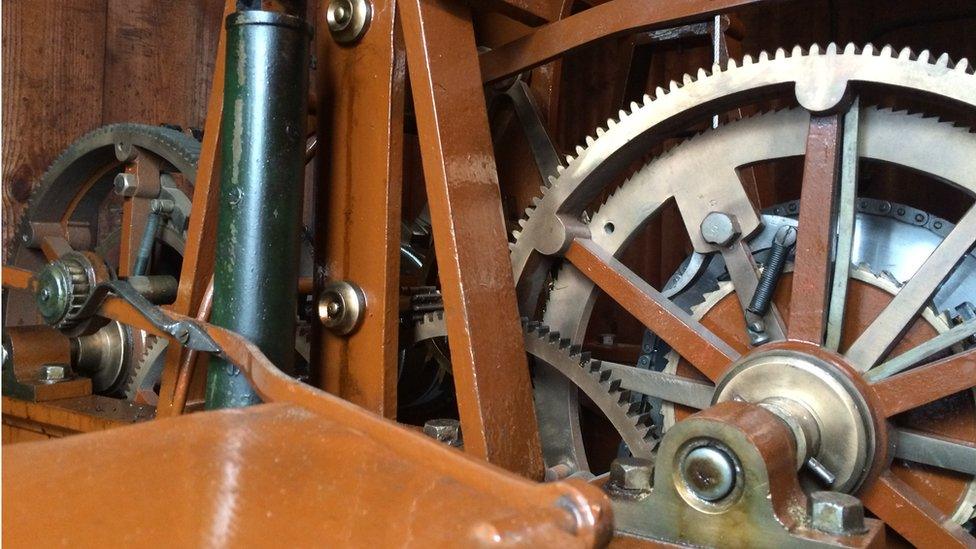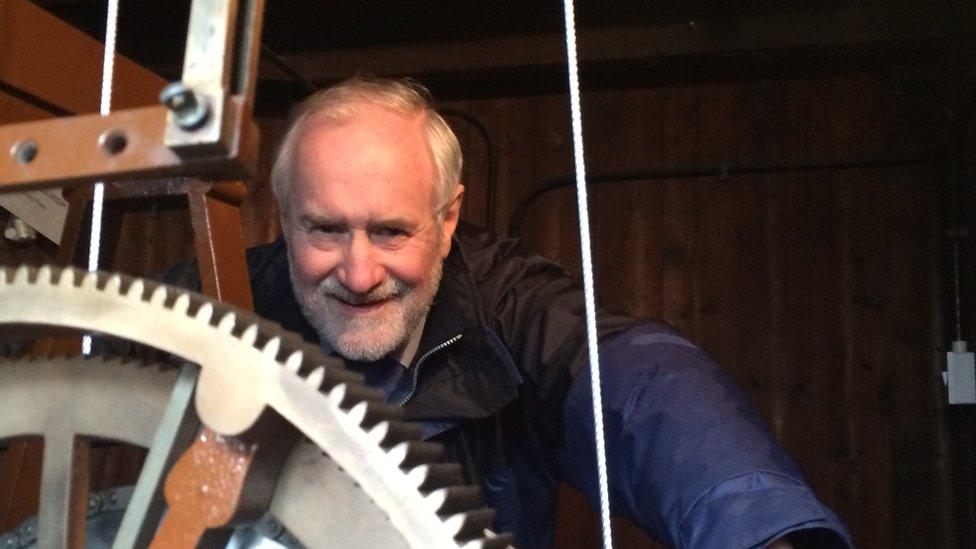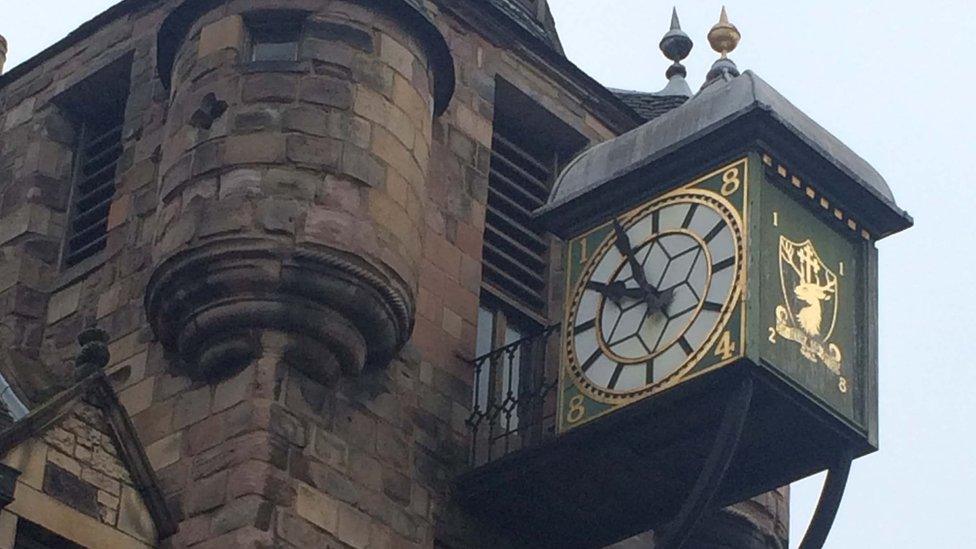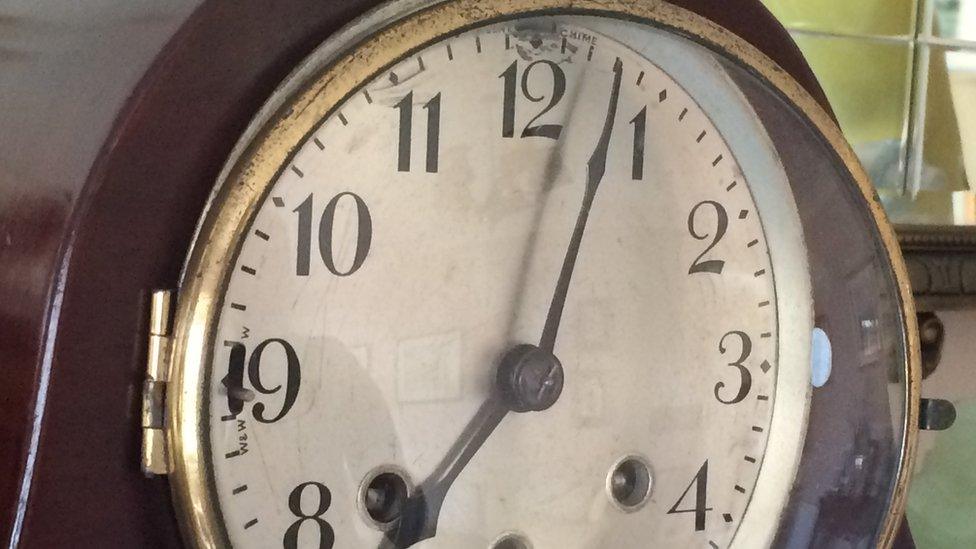Time piece: Keeping up with business as clocks spring forward
- Published

Those ruled by clocks will have an hour less in bed on Sunday
We may be facing an hour less in bed this weekend as the clocks change but there is also the prospect of more light. What time it is can have a very real effect on our lives including the way we do business.
"Time is an absolutely limited resource," says blogger and writer, Gerry Lynch, "it's the one thing you can't make any more of."
"In this very digital world where our lives are regulated very much by computers, I think time really connects us to the natural world around us."
The ancient Babylonians used water clocks which counted drips, candles have been used to keep time overnight and of course people have followed the Sun, but until relatively recently in history it was not thought necessary to standardise time.
"Once you had railways," explains Mr Lynch "not only were they going much faster but when they met at junctions there were massive safety implications because at first the railways tended to run at the time of their headquarters."
That could be different in different towns and cities.
Now of course time is global phenomenon about communication, trading and a world which seems to get smaller.
There is a lot of heritage to clocks too.
It is up narrow, winding stone steps to the clock room at the People's Story Museum in Edinburgh, housed in the old Canongate Tollbooth.
The mechanism - shiny wood and metal - connects to a clock mounted on an outside platform. It is a real landmark.
"The noise that you're hearing is the pendulum," says Alan Wilson of James Ritchie and Son, clockmakers. The company was started in Edinburgh in 1809 and is now part of the Smith of Derby Group
"I think a lot of these clocks are still quite iconic and they hold a bit of love in my heart anyway."

Alan Wilson has " a bit of love in my heart" for old clocks
The company looks after timepieces, including the Floral Clock in Princes Street Gardens, as well as clocks for councils around the country and private owners.
With the clocks changing this will be a busy weekend with staff on the road from the Thursday before to the Tuesday afterwards. They will be adjusting some clocks manually and checking that the automation on others has worked.
But this is an industry which is changing: "I think the hope is that in the future that we can more or less control a lot of the clocks from sitting at a computer, unfortunately," says Mr Wilson.
"Part of the beauty of clocks is going out and meeting people."
But what about how time affects how we trade with each other? It may be easier to travel now than ever but the reality of different time zones remains.
A 2011 study from the University of East Anglia studied their effect on trade and found that although there are many factors at play, including language, distance and the size of an economy, time difference was one of them. It suggested that each hour of time difference can reduce trade by up to 7 %.
"One way in which new technology has been helping has been in terms of allowing us to have a more flexible working pattern," says Edward Anderson, who carried out the research.
"When we want to communicate with countries in other time zones that often means we have to stay slightly later at work or come in earlier in the morning, but I think with new technologies we can work from home for example rather than stay late at the office."
But he points to another business problem associated with time zones - jet lag - saying it remains a significant problem.

The People's Story Museum in Edinburgh boasts a splendid old clock
For others, time management can be an issue in their business life. We all know would should be immune from distraction, good at prioritising, using our time wisely, but the reality can be rather different.
"One of the elements that we've all got the same amount of is time," says Caroline Meikle, head of corporate training for Pitman. One of their courses is in time management.
Part of what they do is to get individuals to understand their role better and to identify what are their "time stealers".
"I would say that about 90% of the people on a train are on their phones," she continues.
"Now they could be playing games, they could be texting, they could be emailing. I think the majority of them are trying to catch up, which in some ways can be time effective.
"But I think that with the stresses you've got in modern life, sometimes it's just nice to look out of the window, sometimes the best use of your time could be to step back from the desk, go a walk, come back with a clear head, a clear mind and start again," she laughs.
And you can hear more about business and time on Business Scotland on the BBC iPlayer.

Businesses worry about "time stealers" but "sometimes it's just nice to look out of the window"